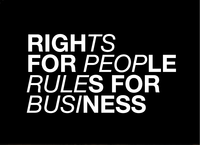
Campaigns against Corporate Abuses in 9 European Countries
This week a network of 250 European NGO’s – represented by the European Coalition for Corporate Justice (ECCJ) – is organising various actions across Europe for Corporate Social Responsibility (CSR). They demand that the European Commission takes steps to hold European companies accountable for damage they cause in developing countries. Today the ECCJ launches the report “Rights for Whom?”. In the Netherlands, the Dutch CSR Platform organises the public debate entiltled “Global Business, Global Rights” on the 11th of November.
The organised actions are part the European Coalition for Corporate Justice (ECCJ) campaign “Rights for Peoples – Rules for Business” (www.rightsforpeople.org(opens in new window) ). The Dutch CSR Platform is member of this coalition that represents 250 civil society organisations from 15 European countries, among which the International Federation of Human Rights (FIDH) and national affiliates of Oxfam, Greenpeace, Amnesty International and Friends of the Earth. Activities are happening in Austria, Belgium, Czech Republic, France, Germany, Italy, the Netherlands, Poland and Sweden in order to urge the EU to take measures that will stop corporate abuses and provide access to justice for victims of these abuses.
“From mercury poisoning in South Africa to child labour in India, companies, including European ones, continue to get away with breaches of environmental and human rights standards” states Ruth Casals, ECCJ’s coordinator. “Regrettably, there currently exists no binding mechanism at the international level ensuring that companies are held accountable for any violations they commit, or in which they are complicit”. In its latest report “Rights for Whom?”, the ECCJ illustrates with case studies that EU regulation is essential to prevent corporate misconduct in the future. Additionally the ECCJ presents a concrete set of legal proposals that can enhance compliance with internationally agreed human rights and environmental standards.
The main ECCJ proposals for the EU include:
- Ensure that companies operating in the EU are legally accountable for any harm they cause to people and the environment in and outside the EU;
- Ensure that European companies disclose accurate information about their impacts on people and the environment. They must be transparent about what they do regarding their human rights and environmental risks and impacts;
- Ensure that non-EU citizens, who suffer from the operations of European companies, have access to justice in the EU.
Currently, there is a new policy momentum with the announcement by the Internal Market Directorate General of a new Consultation on the issue of corporate transparency (non-financial reporting). Also pending is the new proposal by the Directorate General on Justice and Fundamental Rights of Brussels I regulation (dealing with access to justice issues) to be released before the end of the year, and the upcoming new Communication on CSR announced by Vice-president and Enterprise Commissioner, Antonio Tajani, for the spring of 2011. “After a few years characterized by lack of policy initiative by the EU on the subject, now is the right moment for the EU to move forward in its political decision-making to improve the accountability of European companies”, sais Ruth Casals.
In the public debate “Global Business, Global Rights” that is held in De Balie on the 11th of November, former minister of Development Cooperation Koenders, politicians, lawyers, business and civil society organisations will go into debate with each other on the necessity of rules and regulation for companies. What kind of laws should be implemented to prevent corporate misconduct? Central topic of debate is better access to justice for victims of human rights violations and environmental pollution is a. Because where should victims go to if there is no adequate legal system in place? The case studies from the new report “Rights for Whom?” are the starting point of this debate. Speakers from India and South-Africa will illustrate these case studies and comment on the consequences of irresponsible corporate behaviour.







